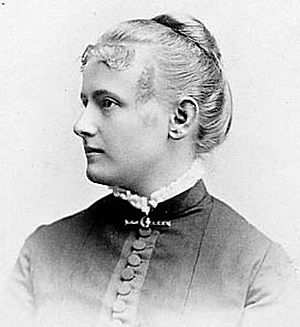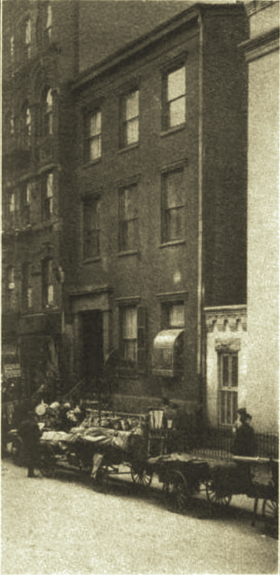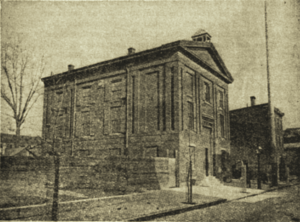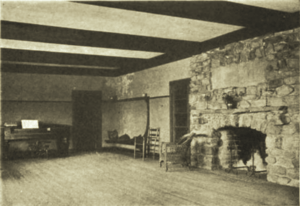College Settlements Association facts for kids
Quick facts for kids 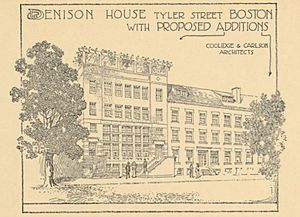
|
|
| Formation | February, 1890 |
|---|---|
| Founder |
|
| Type | Nonprofit |
| Purpose | Support and control of college settlements for women |
|
Region served
|
East Coast U.S. |
| Subsidiaries |
|
The College Settlements Association (CSA) was an American organization that helped set up and manage special houses called "settlement houses" for women. These houses were created by college women, managed by college women, and most of the people living in them were also college women. The CSA started in February 1890 and became an official organization in January 1894. Its main goal was to bring college women together to work on important social issues and inspire them to help their communities. They believed that young students could learn a lot by being part of this practical work.
Contents
History of the College Settlements Association
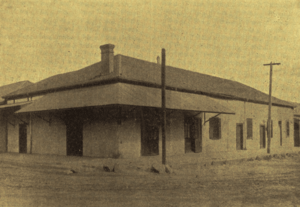
In 1887, a small group of women who had graduated from Smith College started talking about new ideas in helping communities. They were inspired by places like Toynbee Hall in England, which was a settlement house where educated people lived and worked to help poor neighborhoods. The Smith College friends felt that similar work was needed in the United States. They promised to do their best to create a group that would support this kind of work.
In 1888, an appeal was sent out from Boston to gather support. By the spring of 1890, the CSA was officially formed. It had chapters (local groups) at colleges like Wellesley College, Smith College, Vassar College, and Bryn Mawr College. There were also members who were not part of a specific college.
Founders and Early Leaders
The CSA was mainly started by three women from Smith College: Vida Dutton Scudder, Jean Gurney Fine Spahr, and Helen Rand Thayer. Other important founders included Helena Dudley, Katharine Coman, and Katharine Lee Bates. Vida Dutton Scudder and Emily Greene Balch also helped create Denison House in Boston. Scudder was in charge of Denison House from 1893 to 1913.
First Settlement Houses
The first settlement house supported by the CSA was the Rivington Street Settlement. It opened in October 1889 in New York City. This was around the same time that Hull House opened in Chicago. Important leaders at the Rivington Street Settlement included Jean Fine and Dr. Jane Elizabeth Robbins.
In April 1892, the CSA also took over the College Settlement of Philadelphia. Fannie W. McLean and Helena S. Dudley were among its leaders. Then, in December 1892, Denison House opened in Boston. By October 1896, it had grown to include more space. Helena S. Dudley was the head worker there.
The work done at these three settlement houses was different in each place, depending on what the local community needed. They focused on social help, education, and community improvement. Even though there were chances to open more settlement houses, the CSA decided to focus on making the first three stronger. They wanted to make sure they had enough money and good workers before expanding. A fourth settlement house was added in Baltimore in 1910.
What the CSA Did
The College Settlements Association had three main ways of helping:
- Giving money to college settlements.
- Offering special study programs called fellowships.
- Providing education and training.
Financial Support for Settlements
The CSA regularly gave money to the College Settlement of New York (Rivington Street Settlement), the College Settlement of Philadelphia, Denison House of Boston, and Locust Point Settlement of Baltimore. This money helped these houses run their programs and support their residents.
Fellowships for Social Studies
The CSA believed that offering fellowships (special grants for study) to women who wanted to learn about social issues in settlement houses would greatly help their cause. Starting in 1892, they offered fellowships of US$300 and later US$400. These fellowships required the women to live in a college settlement, attend a local School of Philanthropy, and do practical work under the guidance of the settlement's head worker. These fellowships helped train future social workers and researchers. Some of the women who received these fellowships included Amelia Shapleigh, Ada S. Woolfolk, and Mabel Sanford.
Expanding Education and Outreach
Over time, more and more people became involved with the CSA. Many college women directly supported its work. It was one of the main practical projects that college women across the U.S. were involved in together. In 1909, the CSA hired a secretary to help start new chapters and support existing ones. By 1911, the association had chapters in 14 colleges and smaller groups in 31 high schools.
How the CSA Was Run
The rules for the CSA were created in February 1890, and the association became an official organization on January 5, 1894. It was managed by an electoral board, which included a president, a vice-president, a secretary, and a treasurer. You didn't have to be a college woman to join. Anyone could become a member by paying an annual fee of US$5.
In May 1917, a special meeting was held at Mount Ivy, New York, to discuss changes to the association. They wanted the CSA to have a wider reach. They planned to hire an Executive Secretary to manage a central office and an Assistant Secretary to work with the college chapters.
The CSA was supported by annual membership fees and donations. People living in the settlement houses paid a small fee for their board, usually between US$4.50 and US$6.50 per week. Each settlement also received money from the CSA's main fund and from local donations. The association tried to keep its own costs very low. No officers were paid, and most of the money went to printing and postage.
The CSA also published annual reports, which included lists of supporters, and reports from their fellowship students. The College Settlements Association Quarterly was published from 1915 to 1917. It was later renamed the Intercollegiate Community Service Quarterly from 1917 to 1919. These publications are now kept at the Radcliffe Institute for Advanced Study at Harvard University.
Notable People
- Emily Greene Balch, co-founder of Denison House (Boston)
- Katharine Lee Bates, co-founder of Denison House
- Lilian Brandt, CSA Fellow
- Katharine Coman, co-founder; president of the electoral board in 1900
- Helena Dudley, co-founder; first "head worker" at the CSA settlement house in Philadelphia
- Clara French, co-founder
- Frances Kellor, CSA Fellow
- Vida Dutton Scudder, co-founder
- Jean Gurney Fine Spahr, co-founder
- Helen Rand Thayer, co-founder
- Adaline Emerson Thompson, president
- Elizabeth Sprague Williams, head worker at the CSA settlement house in Rivington Street
See also
 | Roy Wilkins |
 | John Lewis |
 | Linda Carol Brown |


